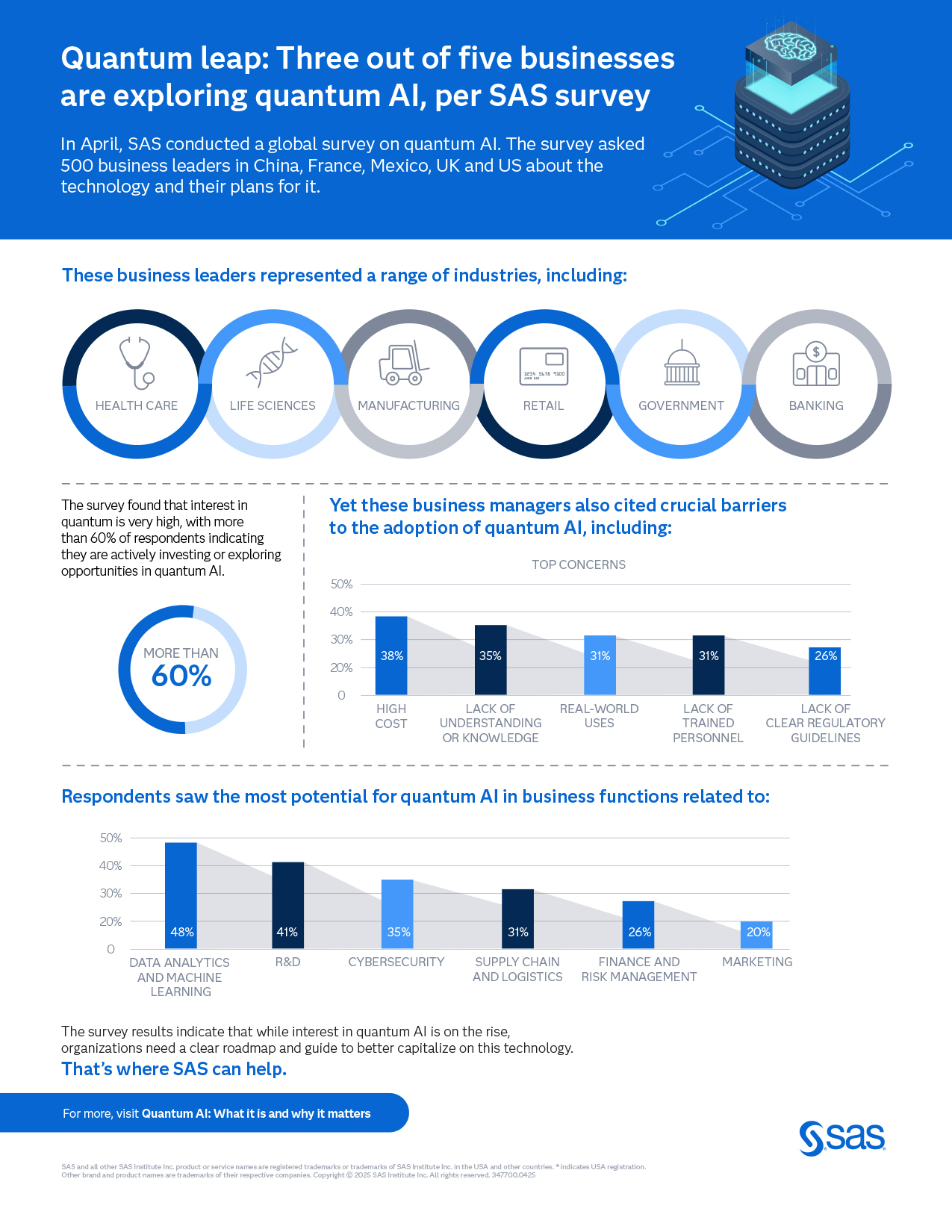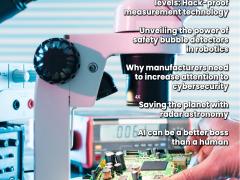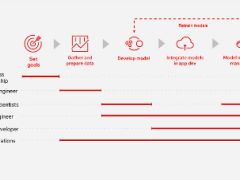Quantum computing and related technologies like quantum AI are regarded as the next big wave after AI. A global survey of 500 business leaders across industries found that interest in quantum is very high, with more than 60% of respondents indicating they are actively investing or exploring opportunities in quantum AI.
Yet these business leaders also cited crucial barriers to the adoption of quantum AI. Among their top concerns were high cost (38%), lack of understanding or knowledge (35%), and uncertainty around practical, real-world uses (31%). The survey results indicate that while interest in quantum AI is on the rise, organisations need a clear roadmap and guide to better leverage this technology.
That’s where SAS, a data and AI solutions company, aims to help. Through pilot projects with customers, quantum AI research and work with leaders in quantum computing, SAS guides businesses to demystify quantum computing, making it more understandable and approachable to a broader audience.
“With the emergence of quantum technologies, companies can analyse more data than ever and achieve amazingly fast answers to very complex questions involving myriad variables,” said Bill Wisotsky, Principal Quantum Architect at SAS. “Our goal is to make quantum research simple and intuitive for businesses.”
In the pipeline
A major, and as yet unrevealed, consumer goods company is currently working with SAS on a proof of concept related to hybrid quantum-classical optimisation, using quantum annealing and SAS classical optimisation solvers.
Sources say this is one of several organisations with whom SAS is collaborating to apply data and AI to complex and compute-intensive business challenges. Quantum AI and advanced models can take advantage of the significant speed increase and expressibility of quantum computers.
Research into quantum AI
Quantum AI brings together quantum computing and AI to develop new algorithms, models and systems that can process complex data, train complicated machine learning models, and solve problems considered challenging or impossible with traditional computers. SAS researchers are focused on key industries that will benefit from the speed and scale of quantum AI, including life sciences for enhanced drug discovery, financial services for better risk management, and manufacturing for improved materials and optimised processes.
Quantum partnerships
SAS also partners with other companies in quantum computing. These companies and their technologies are uniquely focused on applying quantum AI and analytics to solve big business challenges. SAS is now collaborating with:
- D-Wave Quantum Inc. (NYSE: QBTS) – a leader in the development and delivery of quantum annealing systems, D-Wave is the world’s first commercial supplier of quantum computers. Its mission is to help customers realise the value of quantum, today. SAS is leveraging D-Wave's technology in its own research, as well as in work with customers.
- IBM – a leader in superconducting quantum computing. SAS is a member of the IBM Quantum Network. SAS’ goal is to accelerate quantum integration to solve challenging problems using a classical/quantum hybrid methodology.
- QuEra Computing Inc. – a leader in neutral-atom quantum computing. SAS is a member of the QuEra Quantum Alliance Partner Program, which aims to accelerate the development, deployment and use of neutral-atom quantum computers to solve the world’s most challenging computational problems.
SAS is also experimenting with the use of quantum AI components in some of its latest technologies. For example, SAS has conducted an experiment interfacing with quantum annealing technology through SAS® Viya® Workbench, a self-service, on-demand compute environment for conducting data preparation and exploratory data analysis and developing AI models.
In the future, SAS plans to add ways for developers to experiment with quantum AI in tools like SAS Viya Workbench, part of SAS’ flagship data and AI platform.
Global survey
In April, SAS conducted a global pulse survey of business managers across five countries: China, France, Mexico, the UK and the US. They represented a range of industries, including healthcare, life sciences, manufacturing, retail, government and banking.
The survey found that more than 70% of respondents were very or somewhat familiar with the concept of quantum AI. And they saw the most potential for quantum AI in business functions related to data analytics and machine learning (48%), research and development (41%), cybersecurity (35%), supply chain and logistics (31%), finance and risk management (26%), and marketing (20%).
In addition to those noted above, these business managers also cited a lack of trained personnel (31%) and a lack of clear regulatory guidelines (26%) as critical barriers to the adoption of quantum AI.















